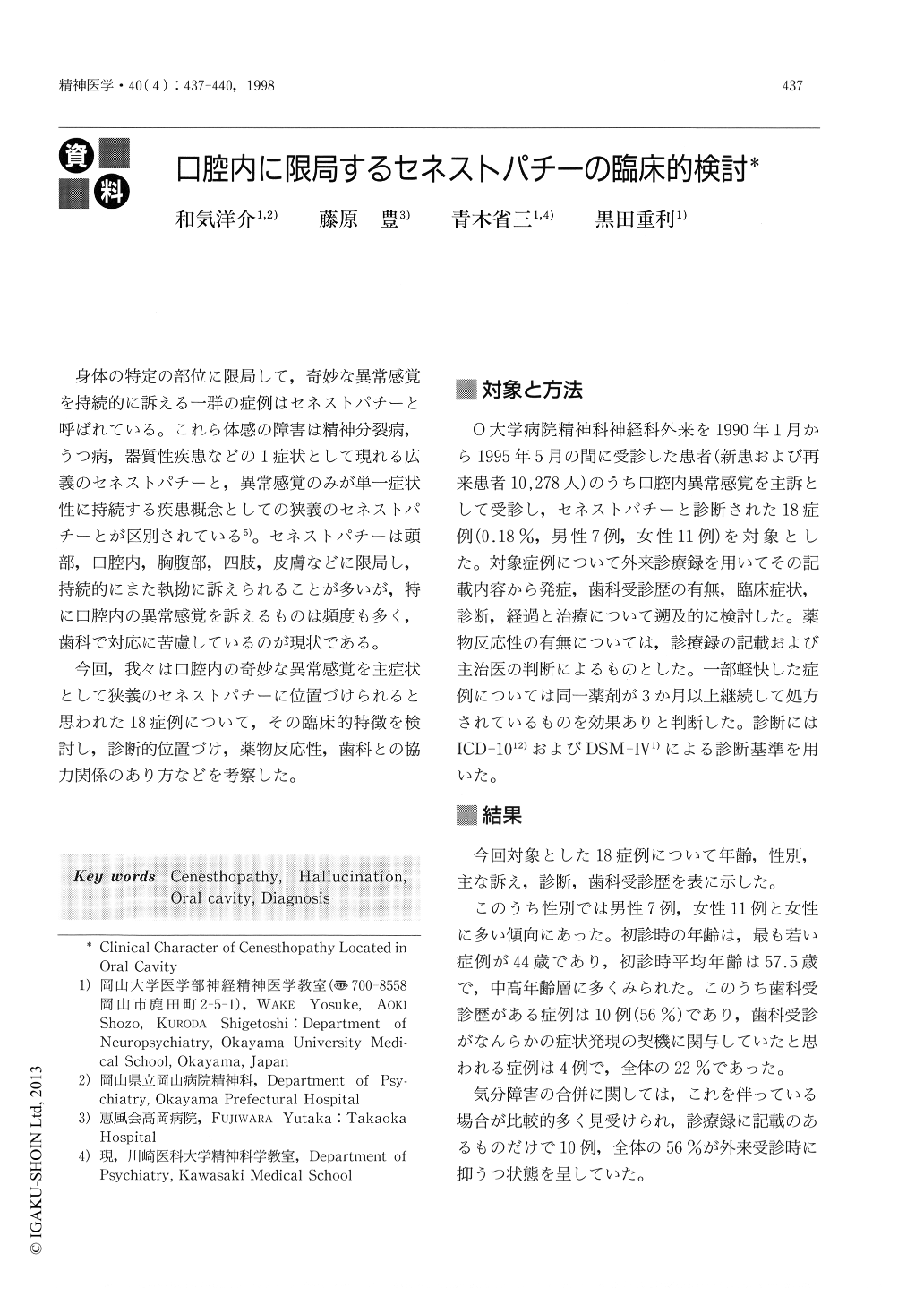- 著者
- 藤原 豊 堀川 敬 本多 敏朗
- 出版者
- 一般社団法人 日本糖尿病学会
- 雑誌
- 糖尿病 (ISSN:0021437X)
- 巻号頁・発行日
- vol.55, no.4, pp.249-257, 2012 (Released:2012-05-28)
- 参考文献数
- 22
日本人2型糖尿病患者を対象に膵β細胞機能の12ヶ月間の変化と影響因子を検討した.著しい高血糖からの離脱例,高度肥満例,進行した肝障害,腎障害,インクレチン使用例,インスリンと経口血糖降下薬併用例を除外し,血糖コントロールが3ヶ月以上良好で安定している症例205名を対象とした.膵β細胞機能はグルカゴン負荷試験のCペプチドの6分間の反応量(ΔCPR)で評価した.検討する臨床指標は,年齢,性別,糖尿病罹病期間,糖尿病網膜症,高血圧,尿アルブミン,HbA1c,血清脂質を用いた.観察開始時(ベースライン)での横断的検討では,糖尿病罹病期間はΔCPRと有意(r=0.357, p<0.001)な負の相関を示した.ステップワイズ法による重回帰分析の結果,臨床指標の中で糖尿病罹病期間はΔCPRを予測する主な独立変数(F=16.951)であった.全対象例の12ヶ月間の縦断的検討で,ΔCPRは有意(p<0.001)に低下した.これらを治療法別に検討すると,非薬物療法群(39名)と経口血糖降下薬群(134名)のΔCPRはそれぞれ有意(p<0.05, p<0.001)に低下したが,インスリン治療群(32名)のΔCPRは有意な変化は認めなかった.経口血糖降下薬群での投薬内容に関するサブ解析で,ΔCPRの低下にインスリン分泌促進系経口血糖降下薬,特にスルホニル尿素薬の関与が強く示唆された.日本人2型糖尿病における膵β細胞のインスリン分泌能の経年変化には,高血糖曝露による自然史的影響ばかりでなく,種々の治療方法の影響が関与していることが示唆された.
1 0 0 0 口腔内に限局するセネストパチーの臨床的検討
身体の特定の部位に限局して,奇妙な異常感覚を持続的に訴える一群の症例はセネストパチーと呼ばれている。これら体感の障害は精神分裂病,うつ病,器質性疾患などの1症状として現れる広義のセネストパチーと,異常感覚のみが単一症状性に持続する疾患概念としての狭義のセネストパチーとが区別されている5)。セネストパチーは頭部,口腔内,胸腹部,四肢,皮膚などに限局し,持続的にまた執拗に訴えられることが多いが,特に口腔内の異常感覚を訴えるものは頻度も多く,歯科で対応に苦慮しているのが現状である。 今回,我々は口腔内の奇妙な異常感覚を主症状として狭義のセネストパチーに位置づけられると思われた18症例について,その臨床的特徴を検討し,診断的位置づけ,薬物反応性,歯科との協力関係のあり方などを考察した。
1 0 0 0 ユーロ安定に初の試練:改定迫られる安定成長協定
- 著者
- 藤原 豊司
- 出版者
- The European Union Studies Association-Japan
- 雑誌
- 日本EU学会年報 (ISSN:18843123)
- 巻号頁・発行日
- vol.2003, no.23, pp.121-139,299, 2003
The EU is on the verge of revising, or at least making flexible the guiding principle of its unified currency. They are making, I'm afraid, a fatal error of judgement. The remarkable success, so far, of the euro was entirely due to the shift of macro-economic principles, from demand management to monetary targeting.<br>The guiding principle of the single currency, of which the most important is to contain budget deficit within 3% of the GDP, was certainly a kind of straight-jacket to many of the participating countries to the euro. The majority of the 12 participants, including such laggards as Ireland and Greece, managed to endure inflationary and other pressures, inflicted by the "one-size-fits-for-all" measures demanded by the stability and growth pact.<br>Ironically, it is Germany, France and Italy, the 3 largest and central countries of the euro zone, that are now crying for help. It is especially paradoxical that Germany, which has been demanding the strict application of the SGP principles, has now excessive budgetary deficit and is calling for flexibility in their applications.<br>As of the beginning of March, 2003, it is not decided yet whether the SGP should be revised or not, but judging from the report the Commission presented to the Ecofin Council, they are sure to make "flexible interpretations", if not revisions to the SGP. Are they right? I thnk not.<br>Ms. Kathleen McNamara, Assistant Professor at Princeton, produed a remarkable book on the euro, called "The Currency of Ideas" (1998). Based on the analysis of the world monetary history after the war, including the Bretton Woods system, she concluded that European monetary systems made a great success, because their guiding principles were shifted from Keynesian to Neoliberal theories. In European context, this meant that all the euro participants had virtually abandoned Keynesian demand management policies and converted to the monetarist approach, which the German Bundesbank had pursued since the end of the World War II.<br>World monetary authorities are now facing unprecedented pressures of world-wide deflation. It is understandable that European financial authorities are demanding flexibility in applying the SGP. But we must remind ourselves that in the colossalised economies, demand stimulus rarely works, as is shown by Japanese policies. Euro financial ministers should be patient.<br>Fortunately for the majority of euro-participants, the March Ecofin Council only produced a very short statement on the SPG that it "provides a robust and flexible framework within which any additional strains on public finances will be addressed". It was reported that Gordon Brown, British Chancellor of Exchequer, had tried to present a plan to make a flexible interpretation to the SGP, but Belgium, Spain, Italy and other small countries prevented the proposal, made in collaboration with France and Germany. The EU might have to endure some period of uncertainty over the euro. But it may turn out to be beneficial to the single currency after all.
1 0 0 0 OA 馬と武術に関する一考察
- 著者
- 藤原 豊樹
- 出版者
- 日本武道学会
- 雑誌
- 武道学研究 (ISSN:02879700)
- 巻号頁・発行日
- vol.40, no.Supplement, pp.62-62, 2007 (Released:2012-11-27)

